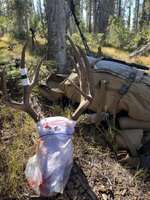@V2Pnutrition So, I'm still well within the timeframe fo continuing to cut calorie intake (5 weeks), but I'm trying to plan ahead as in the past I have held with cutting for 5 months. Additionally, my wife is on board and I need to provide guidance for her as well. I might actually be able to hit my goal in 12 weeks, but she will not and I don't want her to fall into the same trap I did of just continuing to cut.
In the past maintaining weight loss has been a problem, I always tried to tell myself it was muscle gain, but proved with a DEXA scan that body fat is higher than I want. I would prefer not to spend forever cycling up and down by 15-20 pounds.
The following article strikes me as pretty good, but I'm curious how it comes across to you? https://rpstrength.com/blogs/articles/the-value-of-post-diet-maintenance#:~:text=Ease in with calorie increases,were gaining prior to dieting).
My key takeaways are:
-At 12 weeks, even if goals are not met calorie intake needs to be ramped back up (probably better to do it around 8-9 weeks).
-Should probably spend at least as long as was spent cutting in ramping up and holding the increased intake.
Now, how should I determine were to stop increasing and hold?
I figure other people surely have the same questions.
One other question, if I have a really demanding day physically (say a 30 mile run), obviously intake needs to be increased during the activity, is there any place for increased intake the next day, or should I try and consume the entire amount of excess calories burned during and immediately after the activity?
In the past maintaining weight loss has been a problem, I always tried to tell myself it was muscle gain, but proved with a DEXA scan that body fat is higher than I want. I would prefer not to spend forever cycling up and down by 15-20 pounds.
The following article strikes me as pretty good, but I'm curious how it comes across to you? https://rpstrength.com/blogs/articles/the-value-of-post-diet-maintenance#:~:text=Ease in with calorie increases,were gaining prior to dieting).
My key takeaways are:
-At 12 weeks, even if goals are not met calorie intake needs to be ramped back up (probably better to do it around 8-9 weeks).
-Should probably spend at least as long as was spent cutting in ramping up and holding the increased intake.
Now, how should I determine were to stop increasing and hold?
I figure other people surely have the same questions.
One other question, if I have a really demanding day physically (say a 30 mile run), obviously intake needs to be increased during the activity, is there any place for increased intake the next day, or should I try and consume the entire amount of excess calories burned during and immediately after the activity?
Last edited:



